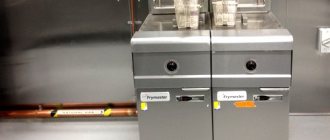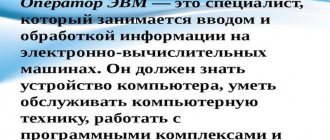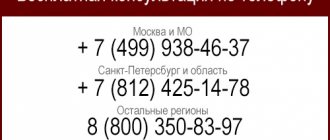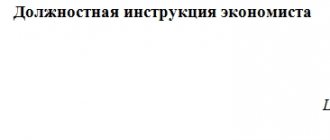| I approve | |
| [organizational and legal form, name of organization, enterprise] | [position, signature, full name of the director or other official authorized to approve the job description] |
| [day month Year] M.P. |
Job description of a commodity expert [name of organization, enterprise, etc.]
This job description has been developed and approved in accordance with the provisions of the Labor Code of the Russian Federation and other regulations governing labor relations in the Russian Federation.
Necessity of the profession
The need and necessity of this profession are undeniable. If an employee performs his job duties well, he will always be in demand as a specialist who can identify counterfeits and determine the quality of products.
In general, the work of a merchandiser in any company is the same, the volume will only vary depending on the size of the organization.
Main features of the profession
This profession is promising where there is a good opportunity for career growth, if the employee has all the necessary knowledge.
The main responsibilities of a merchandiser are to check goods for compliance with prescribed standards, formulate a procedure for receiving and spending valuables, search for goods that have not been delivered to the enterprise, and establish contacts with counterparties.
The position of a merchandiser in any company has similar functions. We can highlight only small nuances contained in the document “Job Description of a Store Merchandiser”:
- formation of orders for goods;
- providing assistance in writing documentation for counterparties;
- acceptance and quality control of goods;
- carrying out inventory;
- Carrying out related and other duties if some store employees are absent.
Professionalism requirements
Requirements for personal qualities
Since a merchandiser is a specialist in the field of organizing trade turnover, he must have knowledge about the consumer qualities of the products being sold, as well as have an idea of their composition, purpose and procedure for use. The specialist is responsible for monitoring the compliance of the composition and quality of the product with regulated requirements, as well as the conditions of its storage and compliance with expiration dates.
The science of merchandising studies the sales and promotion of goods on the market. The capabilities of the product are studied from the point of view of the distributor and the consumer, and not the manufacturer. In accordance with such requirements, a merchandiser must have the skills to organize timely delivery of products in the required quantity. A specialist needs to be able to skillfully carry out promotions and benefit from the sale of products by delivering them at optimal purchase prices and ensuring sales growth.
Advantages and disadvantages of the profession
To competently perform his job duties, a commodity expert needs to have basic knowledge in the field of economics, which will allow him to anticipate a drop in demand. To visually present a product, you need to be familiar with window display techniques.
What should a merchandiser do?
The job description of a merchandiser prescribes the responsibilities, which are as follows:
- prescribe the required degree of product quality;
- check the characteristics of goods that were declared before their purchase;
- submit for discussion to the director recommendations regarding the formation of a procurement plan;
- actively participate in drawing up the production plan;
- maintain control over all contracts, and in addition control over obligations for the sale or purchase of products or materials;
- write letters to counterparties with complaints about low-quality goods, respond to incoming correspondence from counterparties;
- track the waste of raw materials and the degree of loading of goods;
- establish contacts with counterparties;
- participate in the writing of regulations for the company’s work in the field of product sales, quality monitoring, delivery of raw materials, etc.;
- organize accounting of the receipt and expenditure of the entire volume of resources that the merchandiser must monitor;
- search for lost products;
- carry out an inventory of the warehouse and display case;
- conduct research into the reasons for the accumulation of products and materials in the warehouses of the enterprise, develop ways to sell them;
- exercise control over the preparation of products for shipment to customers, prepare the necessary documents;
- generate all reporting related to the performance of duties.
It can be seen that the profession of a commodity expert contains a large amount of work, which requires that the employee have a good analytical mind.
Advantages and disadvantages of the profession
The job position in question can be called universal, due to the combination of various areas of work activity. Mastering this specialty allows you to obtain a theoretical basis in several areas of entrepreneurial activity. Experienced specialists who know all the intricacies and nuances of their profession are in great demand in various areas of production. In addition, these personnel are in demand among companies that act as intermediaries in trade relations between commercial structures.
An employee who wants to take a higher-paid position must understand the specifics of the process of determining the quality of a product. In addition, you need to be able to understand the policies for promoting commercial products. It is important to note that this employee is responsible for various promotional activities, drawing up accounting documents and monitoring all trading processes. In order to become a valuable specialist, it is not enough to receive a good education. It is necessary to constantly move forward and improve your professional skills.
The main disadvantage of this type of professional activity is the high financial responsibility. It should also be understood that the employee will be faced with the need to travel on business trips. It is important to note that the merchandiser becomes an obligatory participant in all conflicts related to the receipt of low-quality goods from suppliers. His responsibilities include resolving such issues. A person who wants to get this position must have high resistance to stress. Otherwise, regular stress will have a negative impact on his work performance.
Features of application formation
One of the important functions of a merchandiser is to formulate an application for a product. He determines the required quantity of products, forms a request, and sends it to the supplier.
When goods arrive, the merchandiser, whose responsibilities are to check the quality of the received batch, first of all examines the invoices for the incoming products, and enters all the data into the program. Upon arrival of the goods, he unloads it.
Upon receipt of the accompanying documentation for the goods from the driver, he checks it. After unloading, he receives the products and checks the batch for the quality and volume of goods supplied.
The job description of a merchandiser contains the function of correctly moving goods to the warehouse. This is a crucial moment, because there are a number of goods that should not be located close to each other or they require certain storage conditions. This point is especially relevant if we are talking about the position of “food product manager”.
Every week, a merchandiser compares product databases, checks information on costs and receipts, and payments.
That is, this profession requires a large amount of knowledge, as well as great organization and responsibility.
Where can you get a specialty in merchandising?
In order to competently perform the basic functions of a merchandiser, the employee must have the appropriate level of education . Today, you can obtain this specialty by completing a training course in the relevant field at a technical school or institute. In addition, you need to work for several years in the trading field in order to learn all the intricacies and nuances of work activity. It is important to note that the responsibilities of an employee in different areas of business may differ from each other. Some employers require candidates to have basic knowledge of logistics, merchandising and economics.
It is important to note that this specialty is not only in demand, but also well paid . The average salary of specialists in the region is more than thirty thousand rubles. Workers who do not have professional experience can count on a salary of fifteen thousand rubles. In the capital, experienced specialists can earn up to one hundred thousand rubles per month.
Components of the profession “commodity specialist”
His responsibilities may vary even within the same company. An employee may have the following functions: pricing and creating a product range; control of the availability of the required volume of products in the warehouse; acceptance and delivery of goods from the warehouse; keeping records of goods; control over their storage conditions; generating a purchase request; paperwork.
The main points of the “Job Description of a Merchandiser”
A merchandising specialist is a specialist. There are several categories of profession.
A 2nd category commodity specialist must graduate from a university in a specialized specialty and have at least three years of experience in this position.
For a category 1 merchandiser, higher education is required. Must have at least three years of experience as a category 2 merchandiser.
The director of the company can accept or dismiss from a position by issuing an order.
When performing work, the merchandising specialist uses the following acts:
- methodological documentation for his position, regulatory documentation relating to his duties;
- orders of the company's directorate;
- articles of association;
- operating rules in force in the company;
- job description.
A merchandising specialist is accepted into the company taking into account the fact that he must have the following knowledge:
- all kinds of regulations and documentation that relate to the acquisition of materials and sales of products in organizations;
- modern methods of management;
- technical regulations and standards for products, their main characteristics;
- the sequence of forming plans for the company’s supply and signing contracts;
- ways to track valuables and calculate their required volume;
- on the completion and sequence of generation of reports;
- the basics of warehouse planning and sales of goods;
- conditions of delivery, warehousing and movement of goods and materials (inventory);
- methods for accepting goods, studying their quality, volume and configuration;
- prices set today;
- inventory standards of goods and materials;
- by the type of product that the company sells or produces;
- economic theory, methods and methods of management;
- labor laws;
- operating rules in force in the company;
- labor safety standards.
In the absence of a merchandiser for any reason, a deputy is appointed by the company's management, and he has the rights and responsibilities of the company's merchandiser.
II. Functions
The merchandising specialist is assigned the following functions:
2.1. Determination of compliance of the quality of material resources with regulatory documents and concluded contracts.
2.2. Establishing relationships with suppliers and consumers of products.
2.3. Operational accounting of receipt and sale of inventory items.
2.4. Participation in conducting inventories of inventory items.
2.5. Preparation of documentation for the supply and sale of products, reporting.
2.6. Monitoring compliance with the rules for storing inventory in warehouses.
Merchandiser's rights
An employee in this position has the rights:
- study the development of decisions made by the company’s directorate that are related to its work;
- propose to the management of the enterprise measures aimed at improving its activities related to the functionality specified in its instructions;
- report to your manager about all shortcomings discovered during work in the position, propose measures that are aimed at eliminating them;
- generate requests and receive responses from the company’s immediate managers or specialists who are involved in the performance of their direct responsibilities;
- contact specialists from your own or other departments of the enterprise to more fully fulfill their functions and responsibilities, if this is permitted by internal regulations, or with the permission of the directorate;
- send requests and requests to the administration, the directorate of the company for assistance in the performance of their official functions and rights.
I. General provisions
- A merchandising specialist belongs to the category of specialists.
- For the position:
- a commodity expert is appointed by a person who has a higher professional education without presenting requirements for work experience or secondary vocational education and work experience in positions filled by specialists with secondary vocational education for at least 3 years;
- merchandising specialist of category II - a person with higher professional education and work experience as a merchandising specialist for at least 3 years;
- Commodity expert of category I - a person who has a higher professional education and work experience as a commodity expert of category II for at least 3 years.
- Appointment to the position of commodity expert and dismissal from it is made by order of the director of the enterprise upon presentation
- The merchandiser must know: 4.1. Resolutions, orders, orders, other governing and regulatory documents of higher authorities relating to logistics and sales of goods at trade enterprises.
- 4.2. Market methods of management.
- 4.3.
Performance assessment in the position of “merchandising specialist”
The quality assessor of the duties performed is the head of the enterprise. The assessment is carried out based on the results of fulfilling all the duties assigned to the merchandiser. Here, the level of complexity of the work, independence in the process of their implementation, responsibility, initiative and a non-standard approach to activities are taken into account. The quality of the functions performed and their effectiveness, practical work experience, level of knowledge of the profession, etc. are also taken into account.
IV. Responsibility
The merchandiser is responsible for:
- For improper performance or failure to fulfill one’s job duties as provided for in this job description - within the limits determined by the current labor legislation of the Russian Federation.
- For offenses committed in the course of carrying out their activities - within the limits determined by the current administrative, criminal and civil legislation of the Russian Federation.
- For causing material damage - within the limits determined by the current labor and civil legislation of the Russian Federation.










